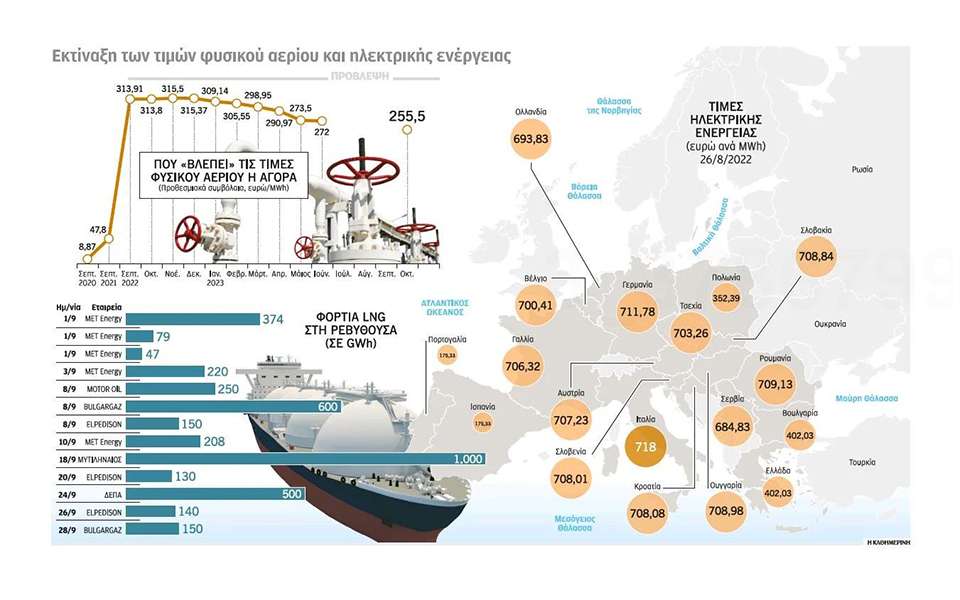
New frenzied price race causes panic at all levels in Europe natural gas as well as electricity. After six weeks of continuous growth in the price of natural gas in the Dutch TTF (reference prices for the European market) rose to 319.9 euros/MWh yesterday before retreating at noon to 313.9 euros.which is 554.6% more than in September 2021.
The long-term storm depreciates futures contracts for the coming winter with a price of 315.9 euros/hour of transit in the fourth quarter of the year and more than 300 euros until February 2023. At unimaginable levels, over 700 euros/MWh, electricity prices are also moving in the wholesale markets of Europe: Italy firmly holds the scepter of the most expensive market with a price per MWh to date of 716 euros, while Germany is in second place with a price of 711 euros. .78 euros.

The exceptions, also stable, are Portugal and Spain (175.33 euros) due to the introduction of a cap on natural gas, as well as Poland (352.39 euros) due to free CO2 allowances and not quite the usual “cheap” markets Greece and Bulgaria at a price of 402.03 euros per MWh. With the exception of Italy, that is, the traditionally more expensive markets of the South are the least vulnerable, and this is due to the disadvantage – under normal circumstances – of limited interconnections, which is now turning into an advantage.
In Western Europe
The rise in electricity prices in the interconnected mature markets of Western Europe has not only been affected by the race for natural gas. The rise in prices was also driven by cuts in nuclear power production in France, where the country’s forward contracts for December jumped to €1,500 per megawatt-hour.
Currently, 30 EDF reactors with a total capacity of 25 GW are not operating, and the shutdown of another 20 reactors for maintenance in the dead of winter (December-March 2023) will reduce France’s available nuclear capacity by another 6-8 GW, leading to a significant electricity shortage. in general in the European market, since France is the main exporter for neighboring countries.
The Greek market, as well as the interconnected market in Bulgaria, which benefited little from France’s cheap nuclear power in the pre-crisis period, do not expect much pressure, and this is one of the reasons why the price of a megawatt-hour in the domestic market is contained at 400 euros, which constrains and Bulgarian market.
The countries of the South hope that, after the pressure that the North is experiencing, common ground can be found for a common European solution.
The first pressure will come with the opening on 3 September of the electrical connection to Italy, which has been interrupted due to a breakdown since 24 August. The re-opening of the cable will allow 500 MW to be exported to Europe’s most expensive market, driving up prices in Greece.
Finally, the impact of September’s natural gas price increase will be reflected in electricity prices in October, and this is due to the fact that electricity producers in Greece set prices based on the average price of the previous month, in contrast to Europe, where prices are per day, in as a result, any fluctuations in the price of gas are automatically converted into the wholesale price of electricity.
RES and brown coal
The fall in RES production during the two months from September to October and its replacement mainly by expensive natural gas as lignite is already operating at its maximum capacity will push prices to over 500 EUR/MWh in the next period. will lead to further fiscal pressure to cover electricity tariff subsidies.
Decline in nuclear power generation, coupled with gas shortages in the main markets of Germany and Italy, as well as concerns about further reductions in natural gas flows and possible interruptions during the winter, increase demand for LNG, creating a downward spiral in natural gas and electricity prices, which turns into a black hole for the European economy.
Winter is yet to come, and gas reserves have not reached the desired level, Gazprom is warning about gas prices, inflationary pressures are mounting, and social backlash is peaking. common ground for a single European solution can be found. The Czech Presidency is, in effect, preparing to convene an extraordinary meeting of energy ministers to discuss a proposal to impose a ceiling on electricity prices.
Source: Kathimerini
Lori Barajas is an accomplished journalist, known for her insightful and thought-provoking writing on economy. She currently works as a writer at 247 news reel. With a passion for understanding the economy, Lori’s writing delves deep into the financial issues that matter most, providing readers with a unique perspective on current events.